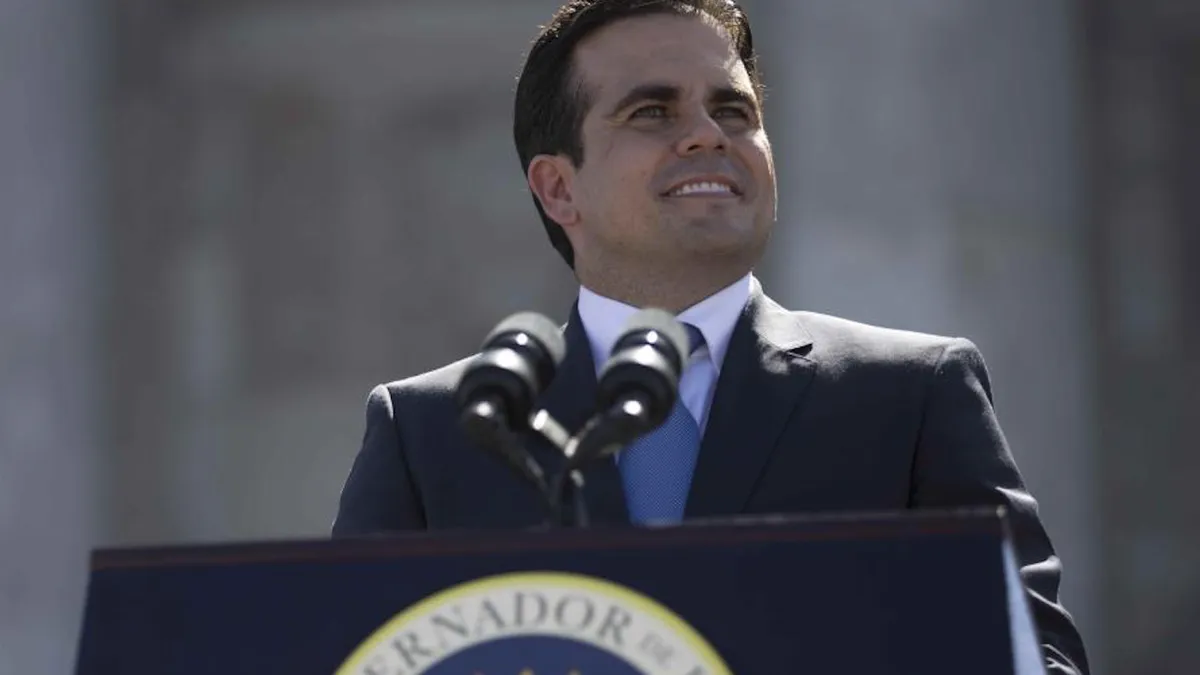Dive Brief:
- Puerto Rico Gov. Ricardo Rosselló this week proposed a major overhaul of the territory's energy regulator, just days after it released a draft of new regulations that will govern the development and operation of microgrids.
- Rosselló's plan seeks to combine the Puerto Rico Energy Commission (PREC) with the territory's consumer advocate and boards that govern telecommunications and transportation. Critics worry the new board will be less stringent in its oversight of the Puerto Rico Electric Power Authority (PREPA), the public utility beset with financial and management issues.
- PREC said last week it received more than 50 sets of recommendations to help form its new microgrid rules. Comments are open for 30 days, and observers expect microgrid rules to survive the reorganization.
Dive Insight:
More than three months after Hurricane Maria destroyed Puerto Rico's electrical system, half the island remains without electricity, and the territory's leaders are looking to overhaul its energy regulator.
Under Rosselló's plan, the PREC would be replaced with a single regulator that would oversee energy, telecommunications, transportation and other functions. Commissioners for each area would answer to a single department leader, who, like the commissioners, would be appointed by the governor.
Critics say the plan is a ploy from Rosselló to wrest authority from the PREC. Though it still must be approved by the legislature, some worry it could return PREPA to its days of virtual self-regulation, when the company was seen as much as a public employer as an electricity provider.
"After more than seven decades of self regulation, lack of transparency, corruption, and unwillingness to embrace innovation, the independent, nonpartisan Puerto Rico Energy Commission has been working really hard to 'control the monster' that PREPA became over the years," former Puerto Rico Sen. Ramón Luis Nieves told Utility Dive via email. "Rosselló’s proposal to consolidate PREC with other regulators will return energy regulation to the incompetent and partisan hands of the management of PREPA.”
Other observers say the impact of the reorganization could be blunted by PROMESA, a 2016 law passed by the U.S. Congress to enact fiscal reforms in Puerto Rico. That law dictates a role for an independent regulator, noted Jorge Camacho, a former regulatory staffer working with the National Institute of Standards and Technology (NIST).
“If PROMESA was not calling for the commission, then I would say this is a path forward for PREPA to self-regulate," said Camacho, the former infrastructure head for the District of Columbia Public Service Commission. "PROMESA will not allow that to happen."
Due to that law, the new microgrid plans from PREC are likely to survive the regulatory reorganization, Camacho said. Nieves called the proposal a "potential game-changer" for the territory's power sector.
PREC requested comments on the proposal late last year and received suggestions from the Puerto Rico arm of the Solar Energy Industries Association; GridWise Alliance, the New York Smart Grid Consortium and dozens of other groups.
AES proposed a "vision" for how the island could revamp its system: a network of connected minigrids, reinforced by key transmission and distribution lines, that would be powered by 10,000 MW of large-scale solar and 2,500 MW of 10-hour battery energy storage.
GridWise recommend PREC look to the 20 or so states that have grid modernization dockets in various stages of progress. "PREC should consider building on the lessons learned from states with such proceedings that are more advanced and well underway," the group said.
But Puerto Rico has a ways to go. The 29-page draft explains that PREC "intends to provide a stable and predictable regulatory framework, capable of fostering innovation and economic growth through continued investments in the development and deployment of microgrid systems."
Under the proposed new rules, microgrids could be owned by individuals, partnerships, customer cooperatives of at least three members, municipalities, single non-profit or for-profit entities and government entities, including PREPA.
PREC is proposing three size categories for microgrids. Individual systems would have one or two customer-owners. Small systems would have at least three and no more than 10 customers or customer-owners and a total generating capacity of no more than 250 kW. Large systems have more than 10 customers or generating capacity over 250 kW.
Also, microgrids must be built with renewables under the proposed rules. Applications must identify the proposed systems as renewable, combined heat and power, or hybrid systems, meaning 75% of the power generated must come from clean sources.





















